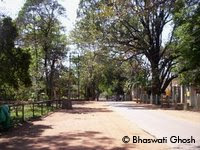 Peep Peep Don't Sleep
Peep Peep Don't SleepBy: Ajay Jain
Kunzum
Non-fic (Travel)
Price: INR 350, US $19.95, UK £11.95
Available at: Ajay Jain's Blog
We thought travel was about visiting places, soaking up the atmosphere of new territories, and relishing the journey. Who could have known Road Signs could be part of the travel entertainment package as well? Yes, Road Signs, those inevitable pointers along the way that we take no more seriously than empty coke cans strewn across the terrains we travel through.
Welcome then, to the world of Border Roads Organisation (BRO), the Indian agency responsible for construction and maintenance of all roads in areas along India’s borders with Pakistan, China, Nepal, and Bhutan. For, BRO, with its BROtherly (even fatherly at times) attitude, can turn the toughest of driving trips along India’s edges into the funniest. Many a traveler journeying through these often rugged stretches must have enjoyed a smirk or four reading BRO’s imaginative Road Signs. Author-journalist Ajay Jain has, however, done a favour to those of us who are yet to grab the fun for ourselves. With his book, Peep Peep, Don’t Sleep.
Jain drove more than 10,000 kilometers, all by himself, through Indian highways for more than a year to photograph some of the most hilarious, and at times, indecipherable Road Signs and advertisements. He didn’t stop there, though, but went on to add witty captions to these images, along with some chuckle-provoking commentary.
Ready for some sampling?
“I am curvaceous, be slow.” Relax, this is no porn movie dialogue; it’s just a hilly road in Ladakh, nudging you, the driver, to go easy with the wheels. And if you still don’t get the message, you are again poked to just “Feel the curves (do) not test them.”
The extent to which BRO can go to encourage drivers to play it safe is amazing. On a road from Dehradun to Mussoorie, a sign speaks thus for a distressed husband:

But BRO can’t place such a sign in just one place. And so they warn female partners again at another spot to not gossip as their male companions control the steering.

Jain’s caption to that image can’t stop wondering though, “…Do only ladies gossip?” My question too.
Then there are the cryptic signs. Ones that instead of making you more cautious with your feet on the accelerator will likely leave you scratching your head. Like the following sign. If you can decipher it, kindly do the author and me a favour by letting us know what it means.

And while you are at it, please crack this one too:

By now, you can make out how earnest BRO is in its aim to keep a check on travelers, especially drivers. If one still fails to heed their message, though, one must be prepared to face embarrassment at some point. With a message that says, “Cution. Short cuts may cut shorts.” With such a warning, one can never take any chances, can one? And if the driver still doesn’t listen to the BRO, well, he or she might have to contend with the deadliest of outcomes:

Ajay Jain didn’t just compile funny, inane, and quirky Road Signs in these 200-odd pages. He also went on to put together some of the most bizarre advertisements found across India. A lot of these he found in Dharamsala, the sanctuary of the Dalai Lama and a large number of his followers. His commentary on this section of the book says it all, “Welcome to the Dharamsala School of Quick Learning… You can find enlightenment and knowledge being sold—fast food style—all over Dharamsala…"

Did you know shopping discounts led to tension? So if you are in Dharamsala, spare yourself needless anxiety by shopping at:

In case you thought all shops selling similar stuff are the same, think again. Or rather, know for yourself by visiting this store in Ladakh:

In the short space of a review, it’s hardly possible to capture the amount of fun “Peep Peep Don’t Sleep” (one of the Road Signs in the book, by the way) packs. As I laughed, smirked and found myself bewildered through Peep Peep’s pages, I also realized this excellently produced book is a keeper. Not only is it a testament to what can happen when the English language is twisted albeit inadvertently, it’s also a manifesto of the BRO’s sincere, if a bit over-the-top aim of cautioning the (sometimes) sleepy, reckless, or drunken driver.
All photos © Ajay Jain
Cross posted at: A Reader's Words





